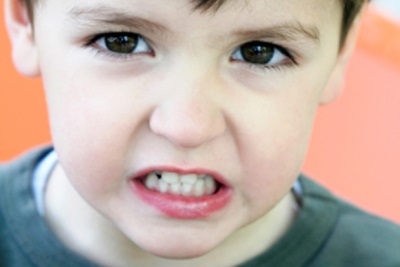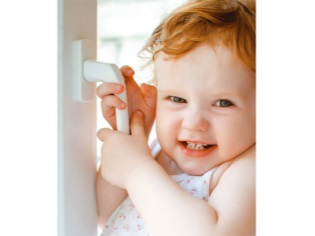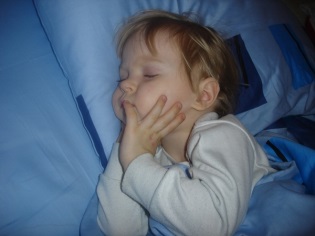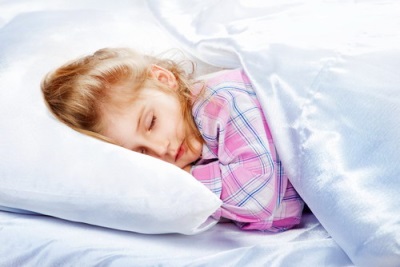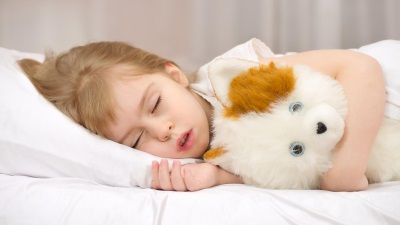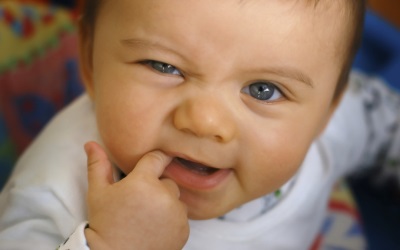Bruxism: baby grind his teeth
More than half of children aged from 6 months to 7-8 years old at night or during the day can hear their teeth creak. Doctors call such a phenomenon bruxism, while not referring to pathological conditions or diseases, but they are not considered the norm.
In most cases, this is a temporary situation that soon passes and does not harm the child, but with prolonged and very frequent episodes of rattle, bruxism can harm the baby’s health. Why, then, can such a problem arise, what to do with the frequent gnashing of teeth and how to forget about bruxism forever?
Why happens at night, why - in the afternoon
Most often, a child scares parents with teeth gnashing at night, however, this phenomenon may occur during the day. The cause of the creaking sounds is often the clenching of the jaws due to the involuntary contraction of the chewing muscles. Bruxism is most often diagnosed at the age of 2-4 years, with predominantly boys.
Factors provoking the emergence of bruxism are:
- Stressful situations due to which the nervous system suffers crumbs. Kids at any age, whether it is 1 year or 5 years old, react to the changes in life quite sharply. The psychological stress on the child can even be an excess of positive emotions, and what can we say about negative stress. The emergence of teeth with creaking is possible when moving, starting a visit to the garden, moving to a new school, a tense atmosphere in a children's team or family conflicts. It can be difficult for a child to cope with weaning (this is a common cause of bruxism at 10-11 months, when it is still early to wean off the baby), loss of a favorite toy, separation from parents or quarrel with a friend, which can also end with teeth creaking in a dream. Even new acquaintances and noisy holidays can provoke such a problem.
- Heredity. It can also be the cause of the creaking of teeth in childhood. It was noted that bruxism is inherited more often by boys and manifests itself at night in children aged 3-6 years. If a relative had a problem in childhood, the genetic factor would be the most likely cause of teeth squeak.
- Teething. This reason can cause teeth to creak both in infancy, when the baby only has the first milk teeth (for example, at 8 or 9 months), and in school-age children who begin changing teeth to permanent ones (from 5-6 years old). age). It is this reason that most often causes daytime creaking of teeth, as the baby experiences discomfort from cutting teeth during the day and tries to eliminate it by rubbing the jaws.
- Overwork. It can be caused by a heavy load of a child at school, an improperly organized daily routine, a long TV viewing or many hours of games on the computer. As soon as the load on the child is normalized, bruxism, as a rule, disappears.
- Dental problems. Bruxism can be caused by a pathology of the jaws (inflammation or anomalous development of the joints) and an incorrect bite. Because of the disturbed bite, a child can often squeak with teeth in the afternoon, trying to make them more comfortable in the mouth.
- Trouble sleeping The emergence of gnashing of teeth is triggered by difficulties with falling asleep, nightmares, snoring, sudden frequent awakenings, somnambulism or enuresis.In most cases, such causes are observed in boys.
- An increase in adenoids. Night gnashing of teeth occurs in many children with adenoiditis. It is caused by the discomfort that the child feels with enlarged adenoids.
- Muscle tension due to lack of B-group vitamins, calcium, and magnesium. Lack of these substances can provoke convulsive contraction of muscles, including muscles of jaws.
If there is a cough
The emergence of squeak teeth happens simultaneously with a cough or stuffy nose. Such manifestations are characteristic of bronchitis, polyps or sinusitis. As a result, because of the cold and shortness of breath, the baby often grits his teeth during the daytime. But, as soon as the underlying disease passes, bruxism disappears with it.
Dangerous consequences
The creaking of teeth is quite often a temporary phenomenon, which stops with the disappearance of the provoking factor, for example, teething or a cold, but bruxism is often manifested so long that it poses problems of the dental sphere:
- Dysregulation of the teeth.
- Premature abrasion of enamel.
- The appearance of microcracks on the teeth.
- The development of caries.
- Increased sensitivity of teeth and gums.
- Inflammation of the tissues around the teeth, which can turn into a chronic form.
- Loosening teeth.
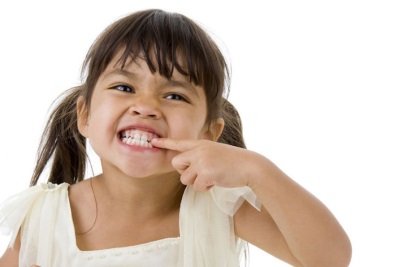
In addition, gnashing of teeth can interfere with night sleep and cause headaches. If we ignore the psychological causes of bruxism, the risk of mental retardation, depression, hearing and sight deterioration, weakening of immunity and other problems increases.
What to do?
If the creaking of the teeth is rare and lasts no more than 10 seconds, it is not necessary to worry, but in the case of the duration of such a phenomenon for more than a month or the duration of the attacks of the gnashing of teeth for more than 10 seconds, certain measures will have to be taken. In order to prevent bruxism from affecting the health of the crumbs and to cause damage to the teeth, it is important to establish the cause of the problem on which to proceed. For this baby, it is recommended to show:
- Pediatrician. This doctor should be treated first. He will be able to reveal the signs of teething, colds or overwork in the baby.
- Neuropathologist. This specialist will conduct a special examination and will be able to identify such causes of bruxism as stresses and problems in the work of the nervous system.
- Somnologu. Such a specialist is able to identify and cure sleep problems.
- Dentist. The doctor will examine the baby's teeth and determine how the presence of dental causes that caused the appearance of bruxism, and find out whether the phenomenon did not harm the teeth.
Treatment
The way in which parents are advised to fight bruxism will be influenced by the reason for the appearance of such a symptom:
- If the occurrence of rattle is caused by an adverse effect on the child’s nervous system, the doctor will recommend to create a comfortable and relaxed atmosphere in the house, to invite guests less and not to go to noisy places. Walking and sports are encouraged, but active games and TV shows at night should be avoided. At bedtime, the baby can make warm baths, which add herbal teas with soothing action. Additionally, prescribe B vitamins, since they have a beneficial effect on the functioning of the nervous system, as well as use sedatives and aromatherapy.
- Bruxism caused by a hereditary factor practically not treated, but passes with time itself. However, some children may suffer from such a symptom for quite a long time, while in other babies it disappears in a short time.
- If parents noticed that bruxism appeared due to teething, To alleviate the condition of the crumbs, you can use special gels and rubber teethers. They will reduce pain and discomfort, thereby eliminating the reason to grit your teeth.
- If the cause of teeth squeal is overwork, It is recommended to review the regime of the day of the child, adjusting the time of sleep and rest. Additional sections and circles should be excluded from the schedule, and if the child is very keen on a computer or watching TV, strictly control such leisure activities, limiting its duration. Putting the child to sleep at night is an hour earlier.
- With bruxism caused by impaired bite, treatment will be prescribed by a dentist. He will recommend the use of special tires, exercises to relax the muscles of the tongue and face (squeeze and open the jaws, lift the tongue with a slide, stretch the lips in a smile), massage the lower jaw in the evenings, eat solid foods (carrots, apples and other products that need to be chewed for a long time ). For tissue inflammation around the teeth, the child will be prescribed medications and gargles with herbal decoction.
- In a situation where bruxism is caused by sleep problems, appointments should be made by a specialist who is well versed in such violations.
- If the gnashing of teeth is associated with adenoiditis, the child should be shown an ENT, who, depending on the stage and severity of the disease, will prescribe a specific drug treatment or recommend surgery.
- To eliminate the risk of bruxism, such as the lack of vitamins and minerals, child prescribed complexes in which all the necessary substances are presented in the age dosage required by the child.
If there is a risk of damage to the teeth due to night or daytime episodes of scratching teeth, the child will be advised to wear special attachments, which are called caps. They will prevent erasing of the enamel and the appearance of microcracks on it.
When you grit your teeth during the daytime, it is also advised to try to distract the child with an interesting occupation. Go to the park, read a book, play in something new, so that the baby will forget about the unpleasant sensations in the mouth.
Opinion Komarovsky
A popular doctor urges parents not to give antihelmintic drugs to children when their teeth are squeaky without examination, because the connection between worms and gnashing of teeth at night or day is not confirmed by medical research. Komarovsky advises to contact a neurologist and a dentist during prolonged and frequent scratching of teeth, because these specialists will help you quickly and effectively cope with bruxism.
You can learn more about the causes of bruxism and its treatment methods in the following videos.

